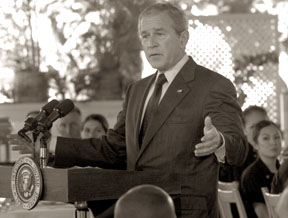|
observer |
|
|
|
|
|
OTHER LINKS |

|

|

|
US troops in Iraq:Bush remains noncommittal
U.S. President George W. Bush withheld judgment on rival calls to beef up or scale down U.S. troops in Iraq, and said angry protests in Indonesia against his Mideast policy were a healthy sign of democracy in the heavily Muslim nation. Facing growing disapproval at home over the Iraq war, Bush, visiting Indonesia Monday, encountered no criticism or demands for troop cuts from the country's President Susilo Bambang Yudhoyono. The Indonesian leader said the "global community must be also responsible in solving the problems in Iraq," along with the United States. Awaiting the results of a Pentagon review and the recommendations of a blue-ribbon commission exploring Iraq options, Bush refused to tip his hand about any change in the level of U.S. forces in Iraq, which now number more than 140,000. "I haven't made any decisions about troop increases or troop decreases, and won't until I hear from a variety of sources," Bush said at a news conference in Indonesia. Indonesia was the last foreign stop on an eight-day trip that also took him to Singapore and then Vietnam, where he met with world leaders to seek a common strategy for talks aimed at encouraging North Korea to abandon its nuclear weapons program. There were heightened concerns for Bush's safety in Indonesia after police warned of an increased risk of attack by al-Qaida linked militants. Bush is widely disliked in the country because of strong U.S. support for Israel and the invasions of Iraq and Afghanistan. Several thousand people marched to the main mosque in the capital, Jakarta, early Monday, some carrying posters showing victims of violence in the Iraq and Palestinian territories. Others unfurled a banner calling Bush a terrorist and war criminal. "People protest, that's a good sign," Bush said. "It's a sign of a healthy society." Countering arguments about his goal to advance freedom in the Middle East, he said that "to say spreading democracy is anti-religious - it's the opposite of that. Democracy means you can worship any way you choose, freely." Yudhoyono said any long-term solution in Iraq should involve a national reconciliation, the strengthening of Iraq's government and the involvement of other countries. "We have to involve all those three solutions before the United States can determine what the possible policies" should be for withdrawal from Iraq, he said. Bush's visit was limited to about six hours in the hill town of Bogor, roughly 70 kilometers (45 miles) south of Jakarta. Thousands of police and rifle-toting soldiers patrolled the streets near the presidential palace. Bush left Monday night for Hawaii, and will be back in Washington on Wednesday. AP |








